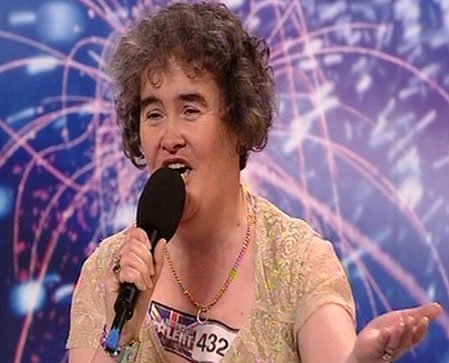When I think of Microsoft stock, images of Susan Boyle in “Britain’s Got Talent” come to mind. The Scottish woman appeared — middle aged, awkwardly dressed, unsure of herself, unattractive by conventional (stereotypical) standards — and expectations of her singing were in line with her appearance. As long as she did not fall off the stage, the audience would have concluded that her performance was a success.
If Susan Boyle was a stock, I’d call her a deep value stock with very low expectations, and thus a great margin of safety, selling at a discount to its fair value.
Then she opened her mouth, and to everyone’s shock, this duckling had a beautiful swan of a voice. She became an overnight sensation. The video of her performance was YouTubed more than President Obama’s inauguration.
Then here comes Microsoft (MSFT). The company’s name doesn’t have the luster it once had. It’s seen as middle-aged, overweight and slow, and it is believed by many that creativity retired with Bill Gates.
The sentiment is so horrible that there is almost universal expectation that it will not come up with another good product, ever. Kodak and Polaroid are now used to describe Microsoft’s “bright” future, and Apple and Google are the ones that will retire it there.
But the ugly duckling is about to sing, and it will be a Susan Boyle-like performance.
Vista’s flop will lead to Windows success
Microsoft is releasing Windows 7 sometime in late 2009 or early 2010 [after I wrote the article Microsoft announced release date – October 22, 2009]. It’s last operating system, Vista was a flop. Consumers did not care for the product and corporations did not upgrade.
Of course failure is a relative term when it comes to Microsoft. At its release, Vista sales were double that of XP, the previous version. Vista still commands almost 24% of market share, second only to XP’s 60% plus.
Windows 7 is not just another new release. It is really Windows Vista 2.0, or Vista-fixed, if you like. Microsoft took Vista’s kernel – the core of the operating system — fixed it, made it faster, improved the interface and added new features, Voila, you’ve got a new multibillion dollar product.
Many corporations did not upgrade to Vista: they stayed with XP. This is now eight years old, a dinosaur in software years. Microsoft will eventually discontinue support and updates for XP. Unless all hackers “pinky swear” (my 8-year-old son’s favorite phrase) that they’ll not try to figure out a way to hack into the 400 million computers that run XP worldwide, a computer running could be left exposed to new security attacks.
Corporations will not likely take hacker’s “pinky swears”, they’ll have no choice but to upgrade to Windows 7. Also, this time they won’t have to do the usual thing and wait for Service Pack 2 — the inevitable set of bug fixes to the original product. Vista’s Service Pack 2 is already out, and in many ways Windows 7 is Service Pack 3. Expectations created by Vista for Windows 7 are incredibly low for Microsoft, but 7’s success is likely to be very high.
Other reasons to go Bing
There’s more: Aside from Windows 7, there is plenty of promise in other products that are not built into Microsoft’s stock. Bing, a new, improved search engine, is just out and the presentation I’ve seen of it is very impressive [played with it for couple of days now, looks good]. Office 2010 will bring a subscription-based office onto the Web which may fix a longstanding consumer piracy issue. (I personally don’t know a single person who actually bought a copy of Office for home use. Maybe I need new friends, but people just don’t want to pay $300-400 for something that we consider our birthright. )
With Office Live, Microsoft will charge an annual fee, and you’ll get a Web product that has the same look and feel of the Office you are used to using at work.
This ugly duckling is not hanging by a thread. Microsoft still has Windows, server products and Office, holds a leading position in gaming, generates billions of dollars of free cash flow, has $23 billion of cash and its debt will likely be trading at lower yields than Treasury’s very soon.
But the best part, there is nothing positive priced into this stock, which trades at about 10 times free cash flow. It is incredibly cheap. Buying it now is like a talent agent signing Susan Boyle as a client the day before she went on stage.
P.S. Though I’ve written this article last week, before Susan Boyle lost on Britain’s Got Talent, her loss did not make the point of the article any less valid. J In fact, I spent several hours this week watching Britain’s Got Talent on YouTube with my wife and kids. What an incredible show. Susan Boyle did not win, but did not lose either, she’ll will likely become a big star – she has a wonderful voice. I’d buy her CD and go to her concert in a heartbeat.









0 comments